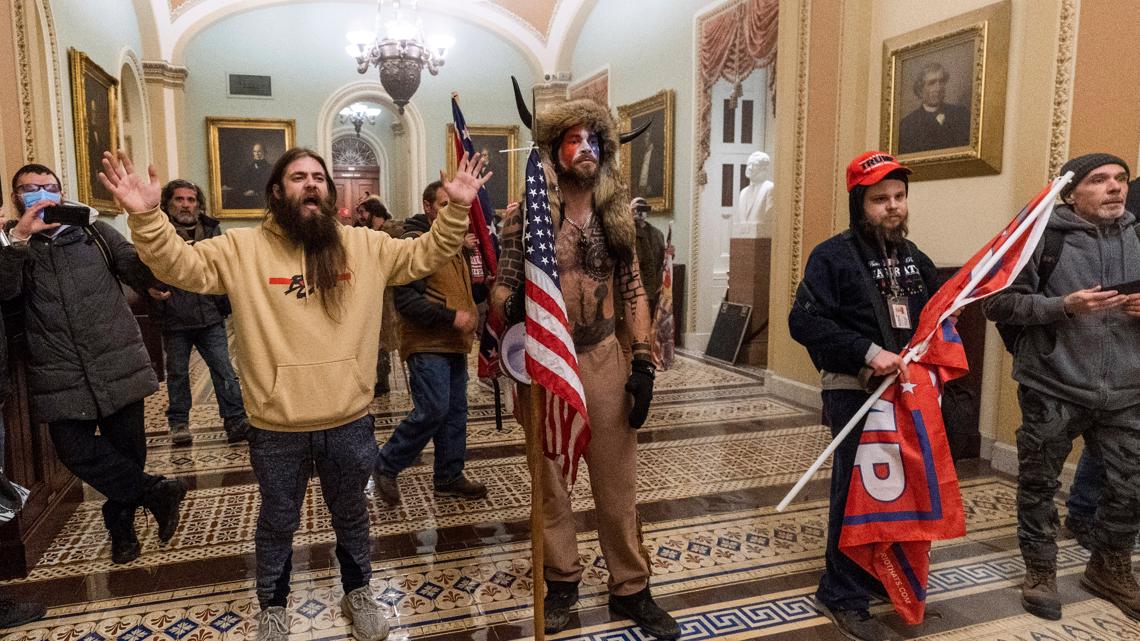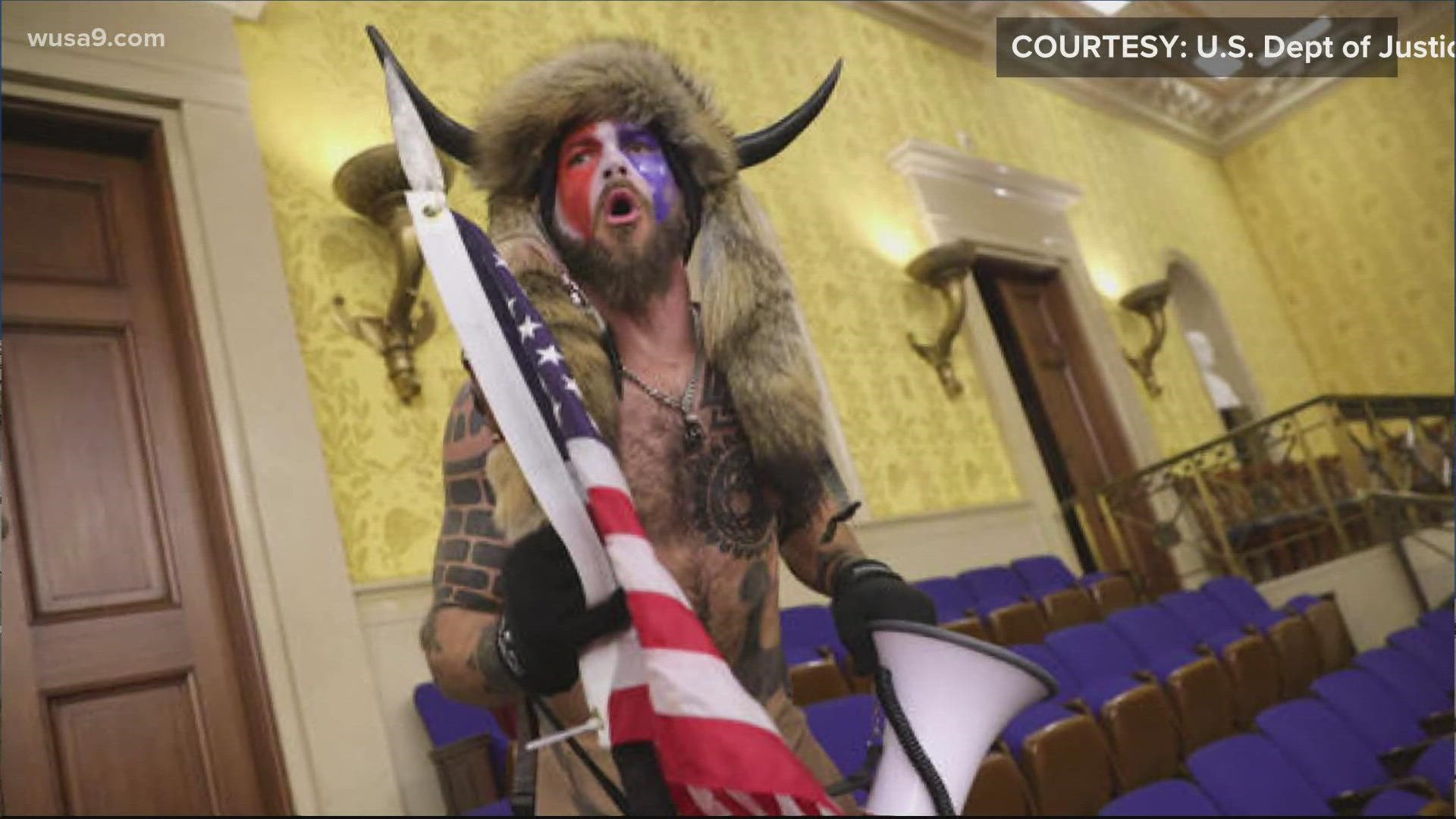WASHINGTON — Jacob Chansley – the Arizona man known as the “QAnon Shaman” who became one of the most recognizable faces of the Capitol riot – has dropped his effort for a direct appeal and instead will attempt to get his plea deal thrown out, his lawyers confirmed this week.
Chansley pleaded guilty in September to one felony count of obstruction of an official proceeding. In November, U.S. District Judge Royce C. Lamberth sentenced him to 41 months in prison, saying Chansley had made himself “the center of the riot.” At the time, it was the longest sentence received by a defendant in any Capitol riot case.
Throughout his case, Chansley was represented by veteran Missouri attorney Albert Watkins. Watkins’ eccentric style and penchant for dramatic language sometimes overshadowed the allegations against his client – as when, early on in the case, he described Chansley and other Capitol riot defendants as “short-bus people.” Watkins later claimed he used the offensive language in a gambit to draw attention to mental health issues among Jan. 6 defendants.
Lamberth also admonished Watkins over an interview Chansley did with “60 Minutes+” in March 2021 during what was supposed to be an attorney-client visit at the Alexandria jail where Chansley was being held. Nevertheless, at sentencing, Lamberth commended Watkins on his advocacy for his client.
Less than two weeks after sentencing, though, attorneys John Pierce and William Shipley notified the court they would be replacing Watkins to pursue an appeal. Pierce is a career civil attorney who specialized in commercial litigation and who represented acquitted Kenosha, Wisconsin, shooter Kyle Rittenhouse for a time. Shipley served for more than 20 years as a federal prosecutor before going into private practice in 2013. Together, the two men represent dozens of defendants in Capitol riot cases – including William Pepe, a Proud Boy initially charged alongside Dominic Pezzola, and Roberto Minuta, an Oath Keeper who served on Roger Stone’s security detail on Jan. 6.
Chansley’s new attorneys notified the court of their intent to appeal his sentence in December. Late last month, though, they filed a motion with the D.C. Circuit Court of Appeals asking to dismiss the case three days before their appellant brief would have been due. The filing did not indicate why Chansley wanted to withdraw the case.


Speaking with WUSA9, Shipley confirmed they had decided to drop a direct appeal and instead try to convince Lamberth to let Chansley go back to square one.
“The remedy – IF successful – would be to vacate his conviction, and he would be back in the District Court as if he never pled guilty,” Shipley said.
The first step, according to Shipley, would be to prove Watkins provided ineffective assistance of counsel. Under the terms of Chansley’s plea agreement, which included a waiver of appellate rights, that’s one of only two arguments available for him to challenge his conviction or sentence. Chansley could also appeal if new evidence became available, which his lawyers have not argued.
The standard for proving ineffective assistance of counsel was set in the 1984 Supreme Court case Strickland v. Washington. In that case, the court ruled a defendant claiming their attorney was ineffective must show two things:
- Their attorney's performance fell below an "objective standard of reasonableness," and;
- A reasonable probability that, but for the attorney's poor performance, the result would have been different.
Defendants regularly claim ineffective assistance of counsel, but only succeed in a minority of cases. According to the non-profit Innocence Project, which works to overturn wrongful convictions, the Strickland standard creates an "extremely high burden" for defendants to overcome.


The 41-month sentence Lamberth gave Chansley was at the bottom end of the recommended guidelines for his offense, but Shipley said he and Pierce believed if they could return to the bargaining table with a clean slate they would be in a better position now than Chansley and Watkins were in nine months ago. Shipley pointed to cases where the DOJ has agreed to allow defendants to plead down from the obstruction of an official proceeding charge – a felony with a 20-year maximum sentence – in cases where there was no violence alleged.
Several defendants charged with obstruction have, in fact, pleaded down to misdemeanor-only charges – among them Texas florist Jenny Cudd and New Yorker James Bonet, who both pleaded guilty to one misdemeanor count of entering and remaining in a restricted building. It was not clear prosecutors would view Chansley – who carried a spear into the Capitol and whom the Justice Department has described as the “flagbearer” of the riot – in the same light as defendants like Cudd and Bonet. A WUSA9 review of plea deals in Capitol riot cases did not identify any defendants who entered the floor of the Senate chamber, like Chansley, and ultimately pleaded to less than a felony charge.
Watkins, who delivered an impassioned speech at sentencing asking Lamberth to show leniency and prioritize Chansley’s mental health treatment over prison time, declined to comment about Pierce and Shipley’s ineffective assistance of counsel theory.
“Mr. Chansley is a very bright, peaceful and kind young man,” Watkins told WUSA9 in an email. “On a personal level, I sincerely wish him all the best.”
Shipley said there was no immediate timetable for when Chansley’s motion to have his conviction overturned would be filed. Chansley has one year from the date of conviction to file such a motion.
We're tracking all of the arrests, charges and investigations into the January 6 assault on the Capitol. Sign up for our Capitol Breach Newsletter here so that you never miss an update.

